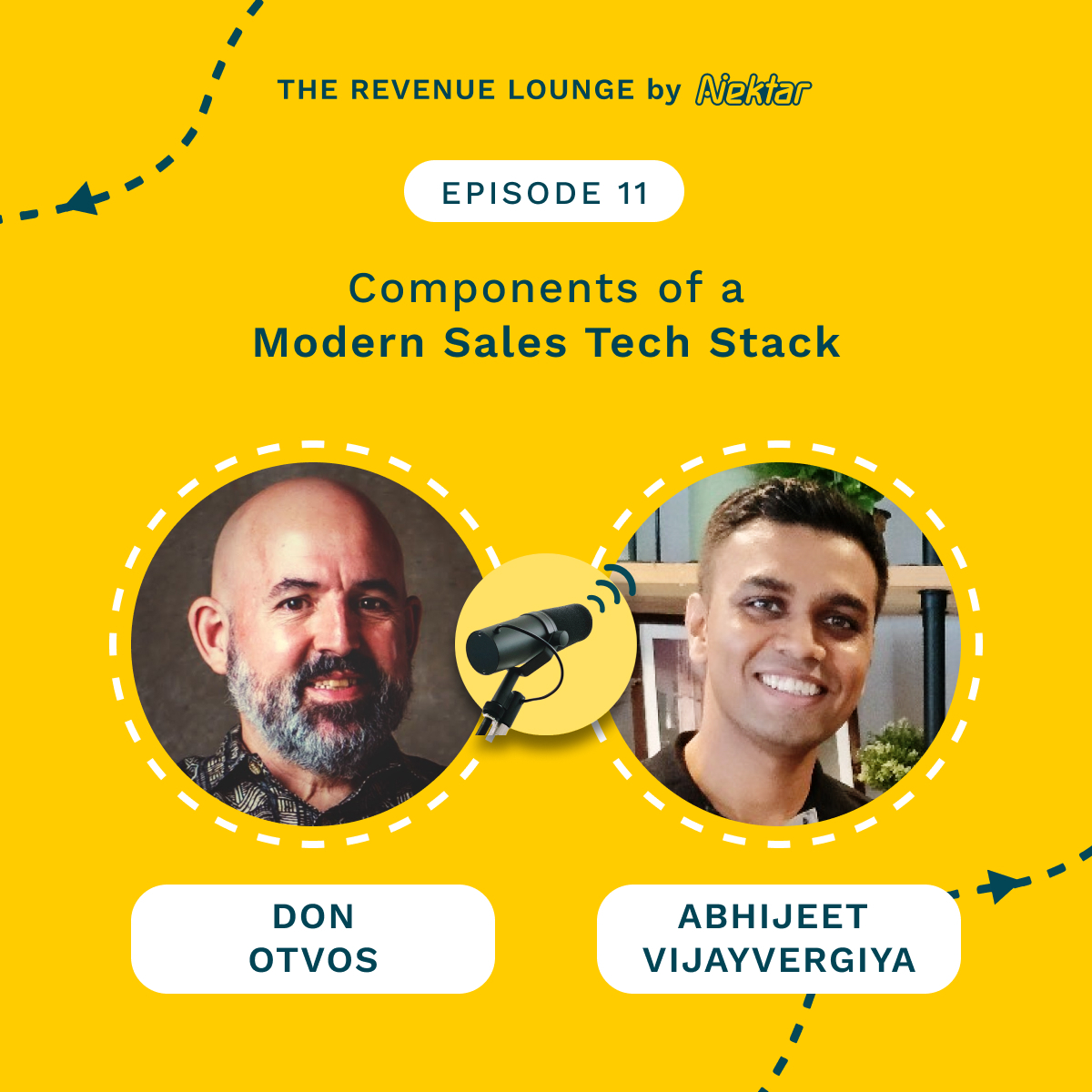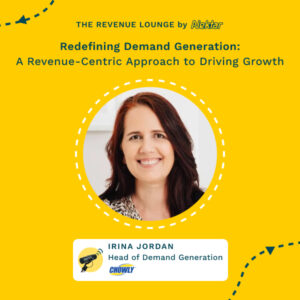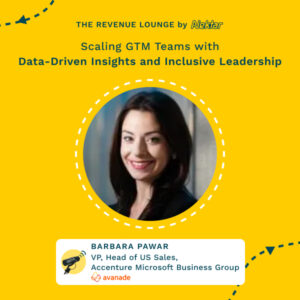Ep #3: Using Activity Data to Drive Sales Productivity
September 28, 2022
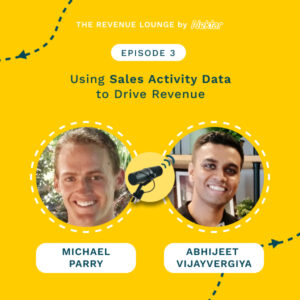
About
The Revenue Lounge
The podcast covers stories from leaders across RevOps, Sales, Customer Success, GTM, Data and Marketing about what drives these functions and what advice they would share with our listeners. With 3 seasons recorded, the podcast currently features 50+ enterprise leaders in the B2B SaaS domain. Tune in to hear from the best in the business
Capturing seller activities can be Achilles’ heel. Adding more admin work on the rep’s plate and not having any meaningful impact on actual sales motion ends up helping no one. So how can leaders do it right?
This podcast highlights how sales operations leaders can effectively measure sales productivity through sales activity tracking. Tracking seller activity plays a crucial role in understanding the productivity levels of sellers for managers and sales leaders.
We have Michael Parry, head of sales operations at Observe.ai, who will help us answer some questions around how tracking seller activity the right way can help in generating more revenue. Tune in to learn more.

[00:00:00] Hi everyone. In today’s episode, we are going to talk about the effective measurement of sales productivity through sales activity. Tracking. Tracking seller activity plays a very crucial role in understanding the productivity level of sellers for managers and sales leaders.
[00:00:15] Capturing seller activities can be Achilles’ heel, adding more admin work on the reps plate and not having any meaningful impact on actual sales motion. It ends up helping no one. So how can leaders get this? In today’s podcast session, we have Michael Parry, who is the head of sales [email protected].
[00:00:33] He’ll help us answer some of these questions around tracking seller activities, tracking leading indicators, and using that to drive revenue and high performance. Welcome to the revenue lounge, Michael. We are very excited to learn from you. Thanks, Abhi. Thanks for having me. Excited as well. I appreciate it.
[00:00:50] Yeah, glad to see that we could finally make it happen. So very excited to learn more about you and your experience as well. And that’s what is my first question. If you can give our audience a quick introduction about yourself and tell us about your role at observe, that would be a great start to.
[00:01:05] Yeah, great. So I run sales operations at Observe, observes a AI platform for the contact center. And so we’re giving companies that run a contact center, a hundred percent visibility into their customer interactions. And then we analyze them for key moments to happen throughout that call. Right. And we.
[00:01:20] We’ve all been there. We’re, we’re on a call and it’s, this call will be recorded for quality purposes and, and we’re effectively build some software to give those companies a hundred percent of visibility into those calls. Versus what happens today is maybe one or 2%, I guess, ever gets analyzed, right?
[00:01:37] And then we can use that data to help drive better agent performance and hopefully better customer experience and other business outcomes for those companies. So yeah, that’s phenomenal. And I did recall. Seeing, observe at a few places winning awards for the ground breaking AI technology. Your team has developed, so congratulations for that and great, great going.
[00:01:57] So very excited to learn more about you as a person as well today. So why did you, walk us through your story. How did you get into revenue operations? What was the journey like? Yeah. Coming out of, out of school, I actually, I spent a couple years as a tennis coach and a tennis pro kind of teaching kids and, and adults how to play tennis.
[00:02:15] And uh, I was working at a country club here in the Silicon Valley and a lot of, uh, technology. E executives and people were the people that I kind of worked with and played with every day. Right. So, got interested in that world and eventually took the leap and got off the tennis court and became an SDR.
[00:02:31] Took a lot of kind of work to break in, but eventually got in and, and it was with a small data forecasting and pipeline management company, and we were only about 30 people at the time and. The great thing about Star is you get to wear a lot of hats. And so I was able to not only be the sdr, but also, you know, start to learn about Salesforce and that’s when I became a Salesforce admin and, and kind of ran that.
[00:02:55] And then I never looked back since then, Kind of knew that I loved that space and getting to work with the different [00:03:00] groups and throughout the company and, and the visibility that you have, right? Kind of within sales revenue ops. So that was kind of the journey and. Went from that small startup to another startup, uh, in Service Max, and that’s where I spent the last seven years before jumping back to.
[00:03:15] More of the startup observe in wanting to build a great team again. So I absolutely love that story for two reasons. Number one, I think you’ve got background in sports, which is amazing. I mean, I personally am a big believer on drawing parallel between sports and sales. They go hand in hand. There are a lot of like best practices and principles from sports and sports management that can be used in sales and sales management.
[00:03:39] And the second thing that I liked about your journey is that you were an sdr. First, you were a user, you went to the grind, and you basically used a system. And then you became a sales op professional where you could have like a user empathy as well when you’ll design and configure the CRM and scale out the tech stack, right?
[00:03:57] So I think for those two reasons, I [00:04:00] absolutely love that journey of yours. And no wonder you’re doing like great in your current role and delivering so much value at observe and done the same thing with your. Uh, or mentions before. So tell us a little bit about the sports performance management experience.
[00:04:15] I noticed that you were a high performance sports scientist at uc, Berkeley. So from driving high performance for your team there to driving high performance out of your reps as led of rev ops. So what are the parallels that one can like, uh, compare? Yeah, a great point. You tracked me back to that experience.
[00:04:33] But yeah, between kind of being a tennis pro and jumping into technology, I was also jumped into, as a sport scientist at uc, Berkeley at the time, they were building a high performance program. We were basically using science to also, uh, to try and predict and help the athletes recover. And so basically what I was doing all day was doing a lot.
[00:04:52] Heart rate testing, and also I would test their iga, which is a am immunoglobulin. You know, I’d [00:05:00] basically take a swab out of their mouth and, and then test their iga, which tends to spike from stress, right? So it’s not only good stress in terms of, hey, we just had a really hard workout, but also. , you know, Hey, my dog died or my boyfriend broke up with me, or whatever the case may be.
[00:05:15] Right? It’s all stress that can lead to poor performance. So yeah, we were trying to use data and science to optimize kind of the recovery, which then leads to, to better performance there, which is, yeah, kind of the same thing we’re doing at in sales and rev ops. Right. How to use the data to impact performance and help coach your AEs and SDRs and teammates.
[00:05:34] Yeah, I think the power of leading indicators, one use case where you’re driving sports performance and one use case when you’re driving revenue efficiency, which is the need of the, especially looking at the current market conditions. So thanks for taking us back in that experience. Absolutely loved here in your journey there.
[00:05:50] The second question I had for you was largely going deeper into this whole leading indicator. Based activity selling. Right? I mean, when you talked about tracking [00:06:00] these activities, tracking these leading indicators, how do you think this helps in improving seller productivity and accelerating revenue?
[00:06:07] Yeah, it’s a good question. You know, I think when it comes down to it, right, the activity that we do every day is the one thing that’s in our control. We can’t always control the outcome, right? Working a deal and the budget gets cut at the last minute, right? The company gets acquired, right? And now we’re.
[00:06:24] That deal goes sideways. So we, we can’t control all those factors, but at the end of the day, it’s what are we doing on a daily or weekly basis and what are those activities that lead to a successful selling motion? Right? Or give us the best chance to ultimately win that deal, which is what we wanna do.
[00:06:40] So, yeah, no, definitely. I like to share this interesting insight from Gartner survey that I read it. It basically mentioned that 68% of sellers, in fact, often find themselves merely going through the motions to meet activity tracking requirements. So unless activity tracking is meaningful, it just ends up wasting [00:07:00] precious time that could have been utilized elsewhere.
[00:07:03] Right. So how do you suggest like one moves from tracking activities for just checking boxes, kind of an exercise to tracking activities, which can be the best meaningful value for a seller’s time? Yeah, I think at the end of the day it comes down to you have to. kind of complete the circle. You have to provide the feedback so it’s not just check the box and move on.
[00:07:29] You know, I had a mentor early on Right, who talked about reporting the news versus making the news, right? And us as sales ops leaders or obviously frontline managers and, and, and otherwise, right? When we’re working with AEs or SDRs, it’s not. Did you do the exercise, but how do we coach them or, or use those as coaching opportunities to help them improve, Right.
[00:07:50] Help them build more skills. So it’s not just a meeting or an inspection. Right. But it’s, it, again, it’s that coaching opportunity. I, I think it is hard work because managers and sales op people, we get pulled in tons of directions. Um, so it’s something just need to commit to and then recommit to all the time.
[00:08:08] Right. As a quick example, right. if, if you’re looking at activity for, on a, on a specific deal and it’s like, Hey, I need to get higher, or I need to get to the economic buyer. Well, yeah, that’s true, but that’s kind of obvious, right? Like we all want to be talking to, you know, the higher people that make the decisions, but the conversation really needs to be more around, how can I help you do that?
[00:08:31] What activity can I do to help you get there or accomplish? . I think that’s really where the conversation needs to go, so it doesn’t feel like a check the box exercise, but it’s more of a coaching and getting better. Right. Exercise. I love the tagline there, Reporting the news versus making the news. I think there’s a big difference out there, and I think how do you get your reps to focus on these leading indicators to drive higher performance and use them as coaching opportunities versus doing a diagnostic on what went.
[00:09:04] Right. I think the, the whole leading indicator concept is very powerful. Moving on to the next question, uh, Michael, uh, what are these activity metrics that you’d advise sales ops people out there should start tracking to see how productive are their team? What are those top metrics that you, you would recommend teams to start tracking?
[00:09:23] Yeah. I’m a big fan overall. Just keep it simple. We can measure everything in the world and there’s a lot. Potential noise out there. But I think if we just boil it down to, you know, actually I think Mike Weinberg does a pretty good job of this, of like, what does an AE do? He creates advances and closes opportunities.
[00:09:41] Right? But on the activity side of it, right? For AEs, we’re really looking at, again, on the front end, more leading indicators, right? Is just, you know, what new opportunities are created. Right? And how many first meetings have they had in a given week or month, right? Whatever period we’re looking. , and then you start drilling down from there, right?
[00:10:01] So if we see, hey, did the guy or gal in the northeast has a lot of activity, then great. And we can dive in there in terms of like, what are they doing right? Where are those activities? Where are they putting their time to get those results? Right? And then on the flip side obviously is just, Hey, we see someone not creating opportunities.
[00:10:20] Let’s dive in there. What activity are they doing? Or maybe they’re not doing right and diving into. Not only for, you know, is there a messaging problem, like are they active and they just not getting the results or. You know, obviously they’re just not active and that’s a, obviously a separate conversation.
[00:10:35] Right. But again, really keeping it simple. And then I think for the SDR is the same thing, right? We goal our SDRs on qualified meetings, and the only way you get qualified meetings is obviously if you have connections, right? And the only way you have connections is, you know, so you, you start peeling back the onion, right?
[00:10:49] Like connections back to calls or emails or again, what’s kind of your cadences? How often are you touching people? , but those leading, or I guess I’ll say those lagging indicators of qualified meetings and stuff happens from kind of the daily activity that we’re doing. Right. So keeping a pulse on that.
[00:11:07] Yeah, definitely. I think it shows spotlight on the gaps between skill and will as well as you pointed out, first of all, if the activities are happening or not, and if they are not happening there, there could be a big issue around. The will of the person then that’s, as you mentioned, is a different issue to tackle or if activities are happening, but the output is still not there.
[00:11:26] So I think there’s a coaching opportunity from a skill standpoint, or it could be a feedback around whether there’s a product market fit problem. Right. But I think tracking activities is, is is the way to go there. I mean, if you don’t have that fundamental unit of measurement from a sales parlance, which is the activity and the touchpoint with whom the activities happened, you can’t get started.
[00:11:46] Right? So we hear you on that. Would you be able to share some examples from your experience across different companies you have worked with, how tracking these activities and these conversations have helped progress your colleagues or or other team that you coached? If you can share one or two examples, that will be great.
[00:12:03] Yeah, sure thing. So again, I think it comes back to completing that loop, right? So one of the things we’re doing now that actually we, we didn’t do at my prior companies, is taking these recorded calls or taking, you know, some of the, the meetings and. having the entire team watch it and then provide feedback, right?
[00:12:23] What went well, what didn’t work well, what could have improved? I think that peer to peer learning is key, and then again, it turns into less of an inspection point and more of a, again, a coaching or a learning opportunity, right? I think about just how many initiatives get rolled out and then they don’t get followed up on, right?
[00:12:40] So there’s no accountability, in which case the reps just feel like, Hey, I’m just doing all this. , that’s when it feels like the check to box. So that, that’s one thing that’s really, I think, uh, worked well. The last quarter that we started to roll this out is just doing some of this peer-to-peer stuff. All of our managers also watch the videos, so they start to pull out points on their one on ones.
[00:12:58] Just in, again, in terms of some of the key sales skills, right? Like how are we developing the champion, right? How are we. Influencing decision criteria, right? Some of those kind of basic sales skills that we just need to continue to improve. Got it. And when an automation has to start initiative like activity tracking or the broader initiative around activity led selling.
[00:13:20] I think the big problem that a lot of automations run into is how do I capture all activities, right? I mean, a lot of time reps don’t want to log activities. They’re also communicating on different channels. They might be using an email channel with some prospects. They might be using LinkedIn, they might be using phone calls.
[00:13:37] They might be leaving voicemails, They might be meeting in person as well. Now that like the world is opening up post covid, so there are activities happening across multiple channels and this whole digital communication load has increased many folds in the last four, five years. So how can an automation set up like an activity capture or activity tracking program across their sales?
[00:13:58] Yeah, there’s definitely challenges to it, right? There’s more and more data, more and more platforms to use. I guess I’d say start small, just like anything, right? Like crawl, walk, run approach. So start with one use case, and that’s kind of what we started here. We started just capturing their emails and meetings.
[00:14:14] So start there. And yeah, we’re missing out on the phone calls that they make on their cell phones and the text messages that they do, but we’re capture. The vast majority of that, and then we expanded into actually recording the meetings that they hold, right? So that’s kind of where we’re at now. And again, I think that gets us the vast majority of the activity that our AEs are doing, and then you continue to evolve from there.
[00:14:37] So I love the simplicity of it largely from a crawl, walk and approach where I think it’s important. Start small, get that right, move to the next channel rather than trying to boil the ocean in one go. But it’s important to set that culture in, as you rightly mentioned, right? I think get started with it.
[00:14:54] Activity led selling can be the way of life as, uh, the sales ops and managers and leaders start looking at their pipeline. I think activities could be a place where they start and then get onto other aspects of their review. So I think it’s a great thing from. Cultural standpoint as well to include.
[00:15:12] And that brings me to the next point, right? And a lot of organizations face this challenge or push back from their team that, okay, you’re going to monitor my activities and I’m not very comfortable with it. Or they might just feel that they’re getting micromanaged. As a business, you have all the right to capture business communication data, which is part of your ordination and your customers.
[00:15:32] But then from a comfort standpoint, a lot of sales people might not be comfortable. And they might feel they’re getting micromanaged or they’re getting constantly monitored. How do you advise organizations and sales ops managers there convince the users to be okay with this, and how can that be converted into an opportunity to convince them about the value of doing this?
[00:15:52] Yeah. I think it goes back to some of the things we’ve spoken about, right? But the way I rolled it out in my last company, and same thing here. And if we make the parallel back to sports, right? Roger Federer right? Nadal, you know, the best athletes in the world across all sports, they’re reviewing their performance.
[00:16:08] They all have coaches, lots of coaches typically, but they’re watching video, They’re getting feedback. So I think that needs to be the mindset, and that’s how, again, we rolled it out here in terms. Listen, these guys are the best in the world. If, if they can continue to improve and take feedback, then so can we.
[00:16:26] Right? As sales professionals and just people trying to get better every day. So I think that being number one, right. And actually, sorry, quick story before I move on. But I’ve had sales leaders and one sales leaders, you know, said to me is like, I know these guys are experienced enterprise sellers. I don’t think we’re going to record their calls.
[00:16:43] Right. And I use that analogy with them back to the sports. You know, the best athletes in the world, they all review calls, right? We all can get better every day. And then again, that seemed to resonate and kind of shift the mindset from the way we’ve done it. But then back to what we talked about, I think the second thing is, yeah, it’s going to be Big Brother and an inspection point, if that’s how we use the data, right?
[00:17:03] In terms of how many activities did you have this week? And if that’s the only value that we get out of. Then it’s going to feel like that, right? If we can again shift, which is, you know, difficult to do in terms of we all get pulled in so many directions, but if we really block off our calendars, right?
[00:17:19] Block off one hour a week, right? Maybe it starts at one hour a week and just say, Hey, I’m going to review a call as a coaching opportunity, right? So it’s not an inspection point. It’s a way for me to add value to my reps, and like I said, back to focusing on some of the core skills, Did I. Develop my champion.
[00:17:37] Did I ask open ended questions? Did I, you know, influences decision criteria, right? Did I find enough pain there? Like some of these basic sales skills, Can I focus on that and provide value back to my reps? Then it’s not going to feel like inspection. Then they’re going to feel like, Okay, yeah. I can see that I can use that and I can, you know, get better and improve my skills from there.
[00:17:58] Yeah, that’s a great way to initiate some of these programs from an activity led selling standpoint. And yeah, I think coaching is a way to go, right? It’s more constructive, it gives it a positive spin. Compared to tracking. I think it is a great example on how organizations can initiate some of these programs and benefit from that.
[00:18:17] Yeah. I also saw a few studies which basically talk about positive impact of coaching on revenues generation, and a lot of companies that provide quality coaching have seen increase in annual revenues between seven to 10%. And I think in your experience, I’d love to know, have you seen something similar and how these activity insights have.
[00:18:38] The managers coaching ability as well, and also in turn driven up the rep performance. So if you can probably throw some spotlight there or maybe share an example, that would be great as well. Yeah, probably difficult to measure, but I don’t doubt that metric at all. So I guess I’ll have to circle back with you on if we improve this, right?
[00:18:57] Like we just started some of these coaching sessions and again, focusing more now that we’re recording some of the actual Zoom meetings and doing some of these peer to peer feedback, right? So we’ll see kind of where that goes on the overall. Skills, but again, I don’t doubt that for a second. In terms of the, the metric you just pointed out, I think when it comes to just overall, how are we forecasting and feeling about a deal, right?
[00:19:21] I think that’s where we’ve seen a lot of these activity. That’s the first example that came to mind in terms of. , Okay, here, here’s the deal we’re working on. But if we look at the activity of what’s happened, right, Both what’s happened on our side, our outreach, but like also what’s come back from the customer, right?
[00:19:37] And how are they interacting with us? This was something we found early on, even at cloud nine. The first started I was with, in terms of you actually wanted to see more movement in the deal price and stuff like that, cuz at least that meant the customer was engaged, right? We were having some dialogue so that.
[00:19:54] Indicator that things were on the right track. And I think that’s the same thing where we see the activity stuff as we come [00:20:00] up with a strategy for, you know, forecasting and closing the deal is just how’s that activity look from the customer and us. Yeah, definitely. So coming onto the last question of this first section, I wanted to know from you as a vision around sales, productivity and its future, where do you think we are headed?
[00:20:17] What would be the future of, uh, sales productivity? Yeah, I got to get a little futuristic. I think we’ll obviously see software continuing to evolve and get better, right? Provide better insights, not just the data, but better insights around coaching and connecting and connecting all the various activities across the platforms, right?
[00:20:37] I mean, how many platforms do we have now in kind of the SaaS world? In terms of zoom and chat and you know, outreach kind of cadences or sequences and those types of platforms. So I think that’s one. And then also connecting how the person you’re trying to connect with likes to do business, right? I’m sure we’ve all taken like those insights or you know, kind of personality tests.
[00:21:01] There’s stuff similar to that. But just like me personally, , like I will respond, right? If I know the person’s done their homework, if they’re trying to add value, um, I won’t respond to just generic stuff. And then the other thing, like I’m pretty detail oriented, so like if there’s a spelling mistake in an email like that, I get fixated on that and it’s like, I can’t move off of that, right?
[00:21:24] But there’s just certain things like that you can give like, Hey, Aji, when I reach out to Aji, you know, he likes to be connected with like this, right? I mean, I think we’ll start. See stuff pop up that will connect those two, um, to dots to provide, uh, the SDRs or a’s, or whoever, right. Insights into how to better outreach.
[00:21:43] Yeah, I think they’re very interesting applications of how AI can be leveraged. I think productivity is top of mind for everyone. So I do see what you mean there A very interesting example, how you’re not just looking at tracking what activities we are doing or trying inside sort of it, obviously automation is something that’s happening and uh, is going big, but it’s more about like how the buyer needs to be spoken with, right?
[00:22:07] I mean, what will be the better propensity to get responses? I think that that’ll be very interesting, right? I mean, there are a lot of conversations around seller following sales process versus. A seller meeting the buyer where buyer wants to meet right in, in buyer’s journey and is already like a lot more focus around embedding the buying process and following that versus pushing your sales process.
[00:22:29] So I think this takes it to the next level where you’re also getting the buyer’s. Personality into the mix and how they like to be spoken to, or what they like, what they dislike about certain types of communication. So I think it’s very interesting. I do like that angle quite a bit because we do ask this question to a lot of people around what they see as future of sales tech, and.
[00:22:49] Revenue operations or sales productivity. And I think this definitely is a new angle that you explore. So thanks for sharing that. So with that, we come towards the end of our first section. Now it’s on [00:23:00] the second section, which is about rapid fire. It gives us more insight about, about you as a person and love to know more about you there.
[00:23:08] So I was the one book that you recently read and really enjoy. Yeah, so I just reread Essentialism. I think that one just again, strikes the core with sales ops or you know, me and my role. Just, you know, how many different directions you get pulled in. And then I also just read The Power Broker. I don’t know if you’ve ever heard of that, but it’s about Robert Moses and kind of how we built New York.
[00:23:29] So it’s a kind of a biography of a, a very large book, but, but just interesting kind of the dynamics of New York City and how it was built. You know, a lot of influence by Robert Moses. So that was an interesting. Yeah. Yeah, it is. I, I’ll definitely need to read out. Uh, New York is one of my favorite places in the world.
[00:23:46] It’s a great city. I always enjoyed my time there, so definitely a book that should be part of my bucket list. I’m going to read that soon. I’m quite curious around the book, you mentioned Essentialism and how it’s related, there are some principles around sales [00:24:00] ops. Would you like to maybe double click and just give some examples on what about the book you particularly enjoyed that basically has some, some parallel to sales ops.
[00:24:10] How we can get some learnings out of it. I think for me, I guess it puts me in the right mindset or gives some tools to think about in terms of really thinking about doing less, but doing it better. And then also, especially in our, in our work today and kind of knowledge work in general. Right? Like it’s almost more important.
[00:24:28] I, I heard somebody say this, right, but it just again resonated in terms of it’s almost more important that you spend. Thinking about what you’re going to do versus again, just trying to do everything and being busy all day. Right? Again, really thinking about what’s going to drive results back to sales op, right?
[00:24:45] You get hundreds of requests and new fields and new processes and this and that, but you constantly have to kind of. Zoom out and think about the bigger picture of how this is going to ultimately drive revenue or you know, or something bigger within the company, right? Is this going to ultimately go in the right direction?
[00:25:01] So that’s really kind of what it means for me. Yeah, no, thanks for sharing that. So I do agree less is more smart work versus busy work. I think naval, we can’t, I think, tweet it about it work like a lion, not like a cow. So I think that’s quite, quite interesting. Thanks for sharing. Yeah. Yeah. So what’s your favourite part of being in sales ops?
[00:25:23] I think hands down, it’s working kind of with all the people across, functionally across the org, and then solving interesting problems every day. Right. I think that’s what I, I love about, it’s, you know, it’s always different. Always something new to figure out. And what’s the least favourite part? When you get into reactive or firefighting mode, which sometimes you can’t help it, we’re at the end of quarter here, so I’m, you know, probably going to jump to this call with lots of missed calls of, of needing to get deals done.
[00:25:49] I think that’s my least favourite part though, in terms of like, it can be very, reactive or it can be the dumping ground sometimes because they know that, you know, sales op people will figure it out . So, um, you know, and go do that. Right. So Yeah, I feel you. So who is the one Rev ops leader you personally look up to and why?
[00:26:07] Yes. Yeah, so the first person came to, I was Adam Geringer. He’s the VP of Rev at Csig. When I was at my startup and kind of moving from an SDR to to sales ops, right? He was the one that I reached out to, cause he worked with my wife at the time and really just kind of was open and sharing and just added value and kind of got me started on this path, right?
[00:26:27] And gave me some basic things to think about that were hugely impactful just in terms of systems and other things. I think about kind of as you set up a sales ops function, right? So that was one that came to mind and. I guess the second one would be Scott Berg, who was our COO at, at Service Max, and eventually ceo, but really just, you know, he was very good at assuming positive intent.
[00:26:48] Right? And that was just something that, again, just always stuck with me, right? So API assumed positive intent, and I think if we can all carry that around, most people, they trying to do the right thing. And so give him the benefit of the doubt and then work it out from there. Right. [00:27:00] Those. Just do that come to mind.
[00:27:01] Yeah. Awesome. We’ll definitely love to have them on our show sometime. Thanks for sharing that. So what’s one piece of advice that you received from someone that has stayed with you for a long time? If you don’t control your time, someone else will. This goes back to essentials and some of the stuff we’ve talked about.
[00:27:17] Right. But I, I’ve taken that to heart, right? I block my calendar, I time block it. A to-do list can be forever long, and you know the calendar cannot, right? You only have so many hours in the day. So that’s been the one thing that’s critical and kind of changed the way I approach every day and every week.
[00:27:33] And then the other one was just think for yourself. Everyone has a unique picture of how things work and function, and yours is as valuable as anyone’s. Right? So that was something that I, I have written down and I tell all the SDRs that I’m, you know, hiring right now to, but that was a quote from Kelly Slater, the, the pro surfer.
[00:27:50] Right? But. A good reminder, right, that you, you know, and we’re here to add value. So, yeah, no, I think blocking focus time on calendar is so important. I mean, it’s something [00:28:00] which even I started a year back and it’s given me so much time back, so much quality time to focus on big ticket items. Otherwise, I was doing five meetings a day, back to back, and I felt like I was doing a lot, but it was all going down the drain.
[00:28:16] I had no clue what is happening, where my time was. At the moment, I started having those time blocks and it just gave me so much time to reflect upon everything. Zoom out as you, as you mentioned. So yeah, I can vouch for it. Great advice. Yeah. So, so you feel like you’re, you’re making more progress on the, on the key projects you need to Yeah, I do.
[00:28:34] I do. Definitely because I’m able to take, Yeah, yeah. Able to think the big picture. I’m able to come with fresh ideas and yeah, it gives that break that’s needed to energize yourself again. Working like a lion versus working like a cow. Yeah. You hunt, you rest and then you go back. Whereas as a cow, you’re grazing the whole day.
[00:28:54] Right. . So yeah, I think that’s what I like about it. Interesting advice. Thanks for [00:29:00] sharing it. I can relate with it. Last question, what’s one advice you’ll give to folks who are starting their career in rev ops? What would you tell yourself like 10 years back? What, what they should do to excel and DevOps.
[00:29:13] Yeah. I guess two things would come to mind. One is hustle and find ways to add value to others. I think if we, again, just approach every day, every week with that mindset, like how can I add value to others, right? In sales ops, marketing, product pro, product marketing, engineering, whatever, like how can I add value?
[00:29:29] I think asking that question and figuring out that, you know, what you can do, and then kind of more tactical, I guess, would be know the systems, right? I think. Getting Salesforce certified, like and knowing that system and how it works and what it can and can’t do. I think this really gives kind of a sales op person kind of a competitive advantage.
[00:29:52] Cuz I see so many people try to create stuff, but they don’t know how it kind of can work through the different systems where this, you know, Salesforce or all [00:30:00] the other systems you, you know, you have hooked up to Salesforce, right? Know what’s possible so you can create effective processes around that.
[00:30:06] So I think knowing the systems can be a huge advantage. Yeah, no, great advice. And I think Rev Ops is in such a unique position where they’re interacting with so many functions. It’s a cross functional, high impact role, high visibility role as well. So there’s so much of value that one can deliver in that.
[00:30:24] So great advice for somebody who’s bringing the career in rev ops. Just be there out there, add value. Think about what you can do better across the stakeholders that you interact with, and be more strategic. I think that’s one thing that as nectar we also like try to talk about a lot more, and educate is all about becoming more strategic.
[00:30:43] And Jo, just don’t get into tactical firefighting. I mean that happens. You have to do it. It’s part of the job. But I think how we can be more strategic, create a long term strategy or a roadmap, and then. Value become a growth or productivity or revenue driver versus like a cost center, managing systems or data, right?
[00:31:00] I think there’s a big difference between the two and I think Rev op is at that inflection point in our industry where I think it’s creating more and more strategic and it’s becoming like, uh, an equal thought partner has having seat at the table when it comes to taking those revenue impacting decisions in the organization.
[00:31:18] Thanks for joining us, Michael. It was lovely having you and thanks for the candidate chat, sharing your experience, taking us back in time and yeah, I mean, I love the sports and sales analogy and your experience that you lived through that. So thanks again, uh, was lovely having you on our show. Yeah, well thank you as well.
[00:31:36] Thanks for the invite and hopefully I added, added some values for your listeners, so Yeah, you did. You did. Thank you again. Thanks Abhi. Take care.

Ep #1: Navigating the Downturn with a Hyperfocus on Productivity
Listen Now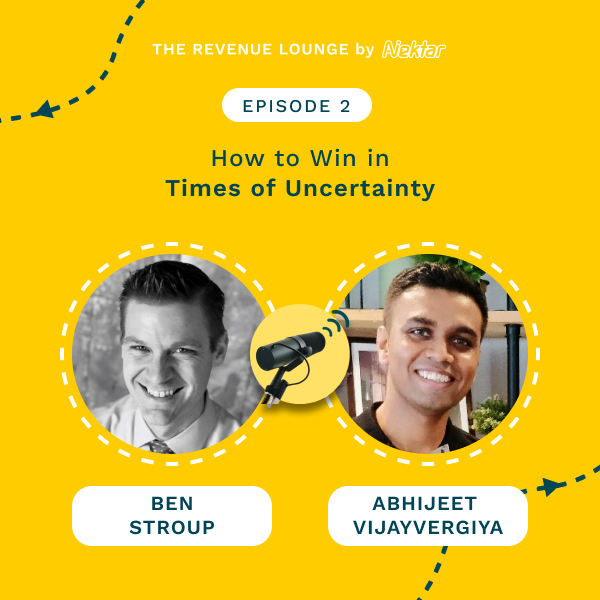
Ep #2: How to Win in Times of Uncertainty
Listen Now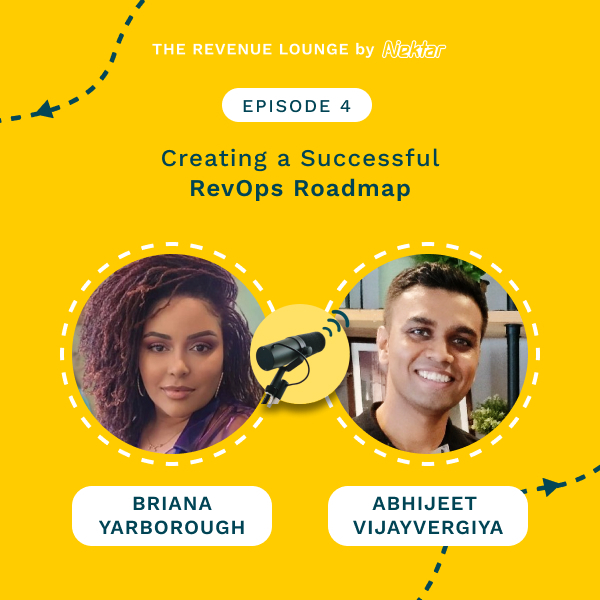
Ep #4: Creating a Successful RevOps Roadmap
Listen Now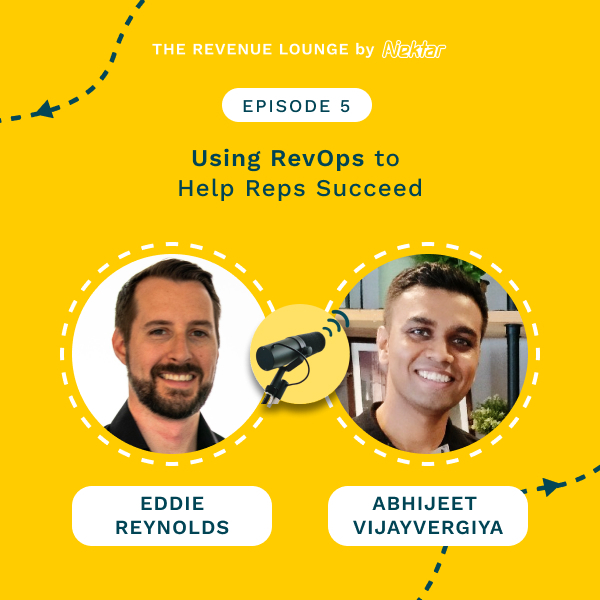
Ep #5: Using RevOps to Help Reps Succeed
Listen Now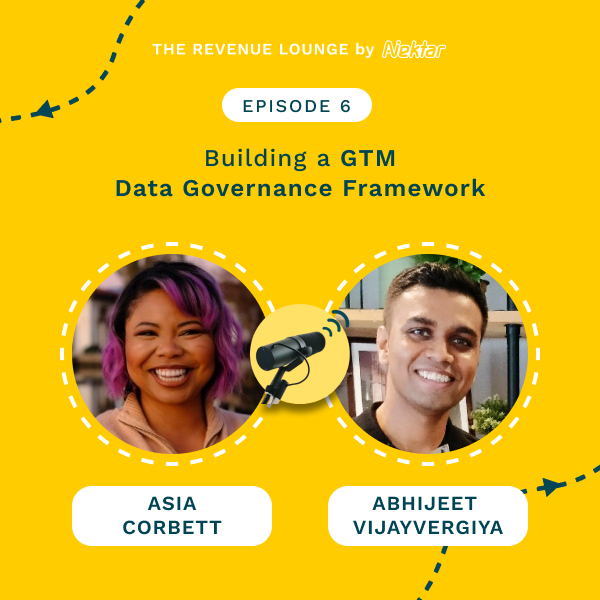
Ep #6: Building a GTM Data Governance Framework
Listen Now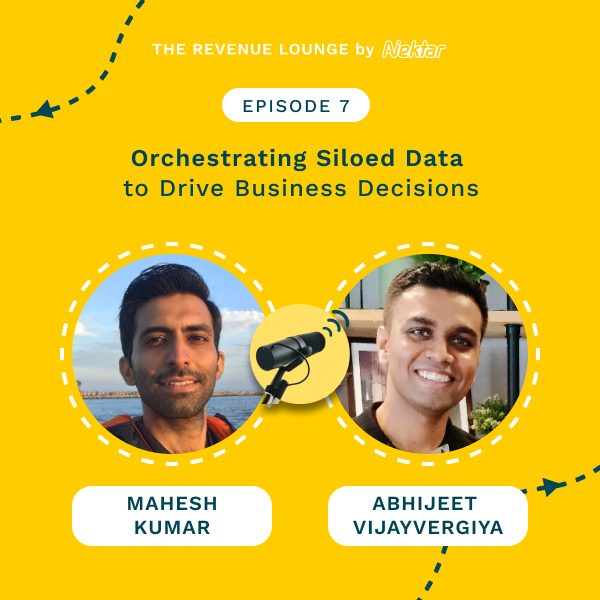
Ep #7: Orchestrating Siloed Data to Drive Business Decisions
Listen Now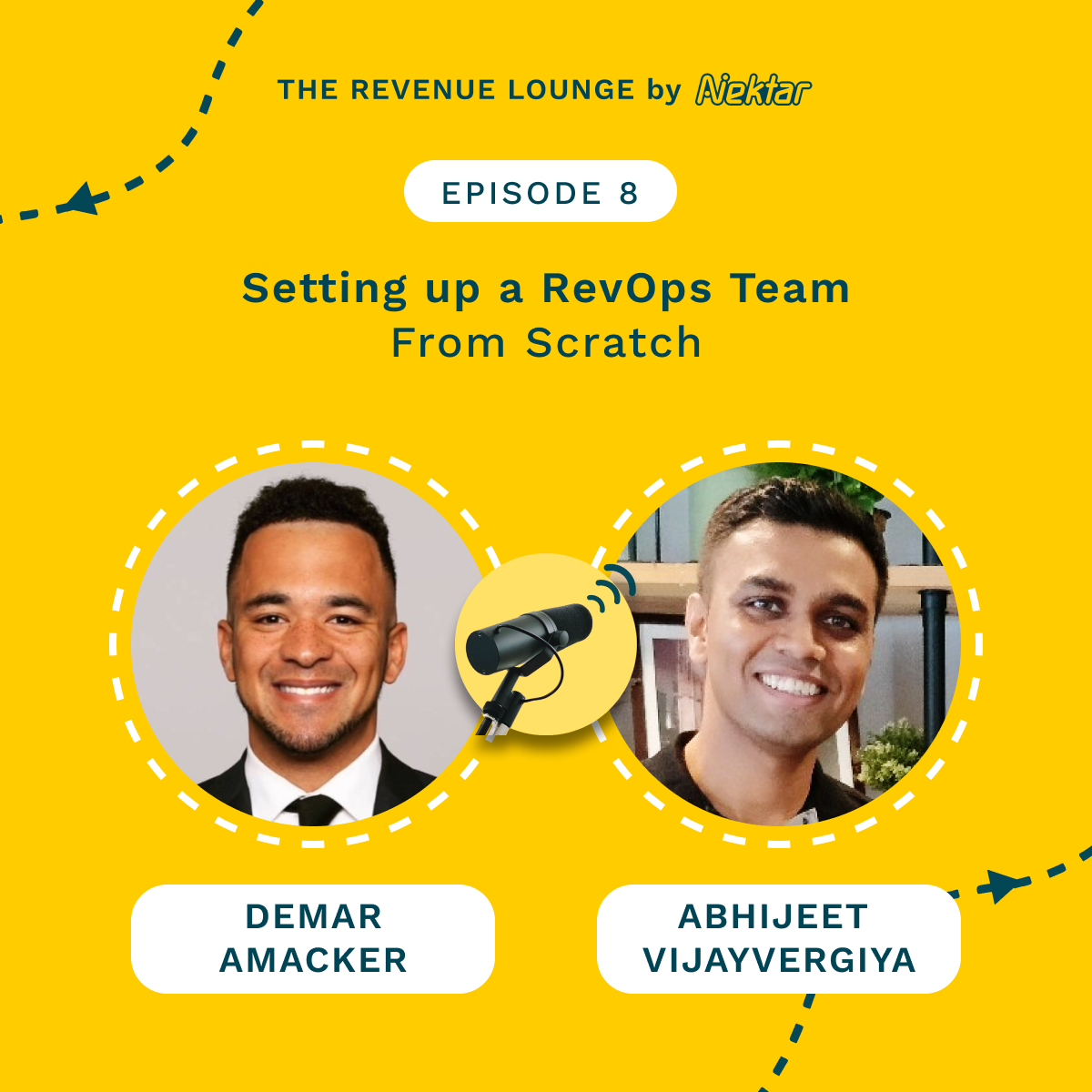
Ep #8: Setting Up a RevOps Team From Scratch
Listen Now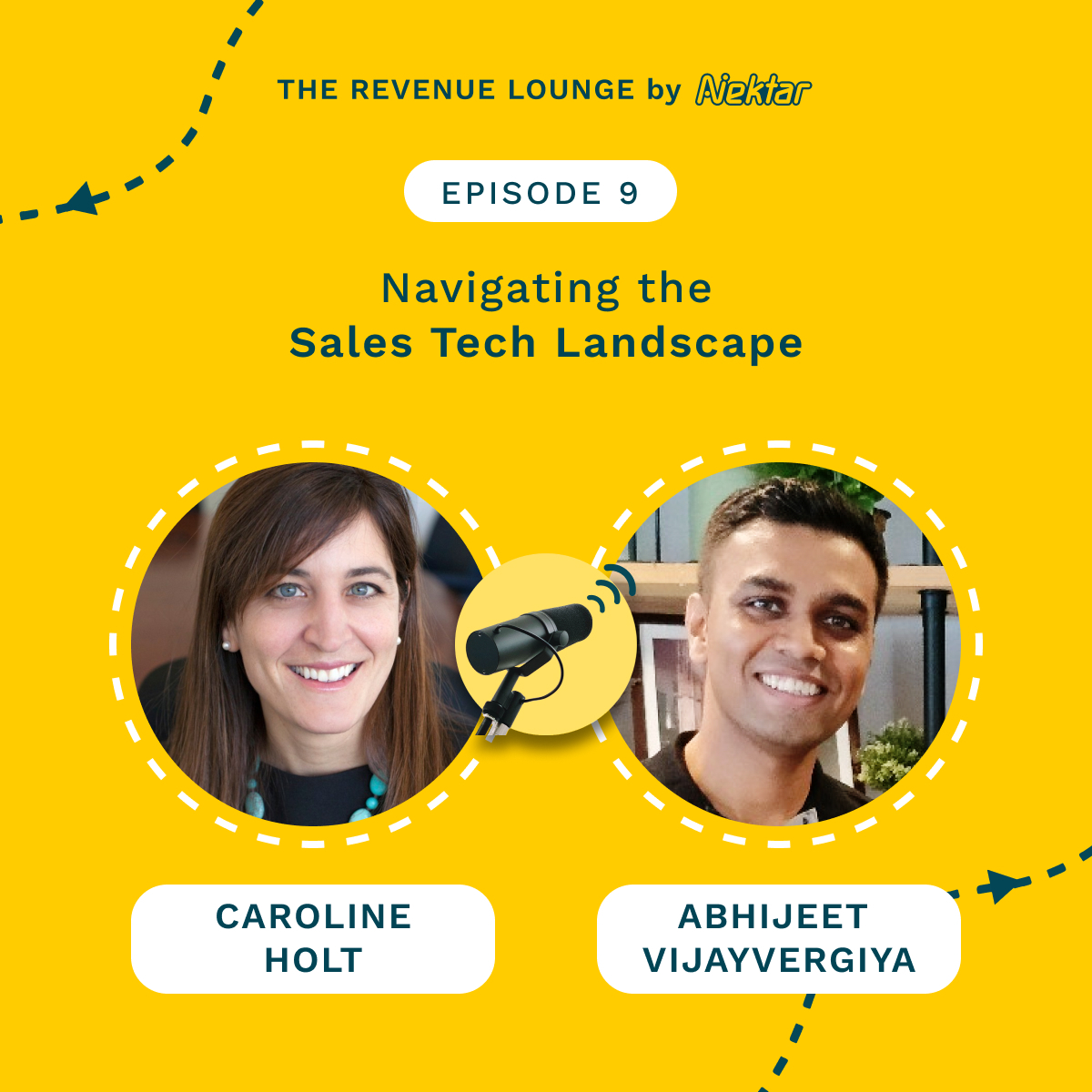
Ep #9: Navigating the Sales Tech Landscape
Listen Now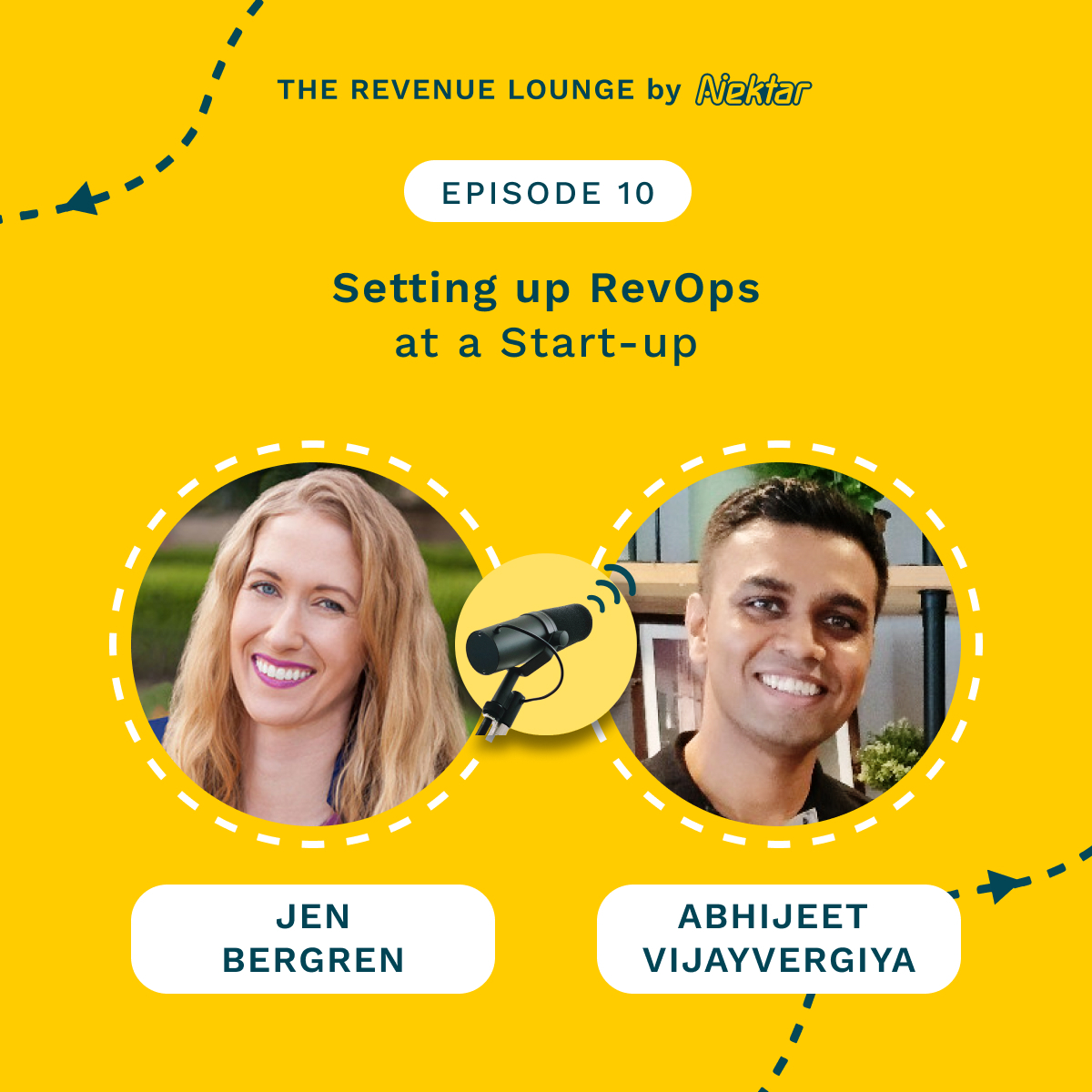
Ep #10: Setting Up RevOps at a Startup
Listen Now